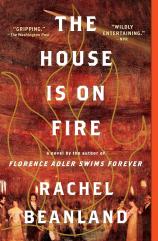Reading Group Guide
Discussion Questions
The House Is on Fire

1. Have you faced a moment of crisis that revealed your true colors or that showed you a side of yourself you hadn’t realized existed? Have you seen moments of crisis reveal new or hidden sides of people you know?
2. In discussing whether to amputate Margaret’s leg, Sally and Mrs. Cowley don’t see eye to eye with Archie or Dr. Foushee. What do their opposing arguments reveal about how each party sees a woman’s place in society?
3. At the end of the novel, Margaret’s health is in peril once again. If she does pull through and survive, do you think she and Archie will be able to have a good marriage and future together? How will the novel’s events affect their union?
4. Discuss some of the parallels between Della’s life and Cecily’s. Why do you think Della has kept some of the facts of Cecily’s treatment from Cecil? Why do you think she’s kept some of the details about Cecily’s paternity from her daughter? If you were Della, how would you respond to Cecily’s initial plan to run away?
5. Put yourself in Jack’s shoes in the immediate aftermath of the fire. If you were him (at his age and in his position), do you think you would have turned the theater company in? How do you think you would have acted?
6. On page 141, Rachel Beanland writes of Gilbert: “He knows that, sometimes, he can be blind to people’s failings, that he’s so eager to see the good in people, he ignores their ugly centers. He thought Good Pete was a decent man because he let Gilbert hire himself out on Sundays, but now he realizes that if he’d really been as good as all that, he’d have freed Gilbert a long time ago. Same goes for Elizabeth Preston, who treats Sara like she is a beloved member of the family, but not so beloved that she is allowed to grieve for Louisa, too.”
Is anyone really a hero in THE HOUSE IS ON FIRE? Who, if anyone, would you consider the book’s heroes? And how are some of the people who may act heroically in certain situations but not in others limited, both by existing power structures and by their own moral compasses?
7. Around the halfway point of the novel, Gilbert returns to the theater green, where he receives applause and a hero’s welcome. At that point in the book, did you think things would work out for him and Sara? Did you think he’d get rewarded for his bravery? What about later on, when he’s told some of the townspeople will buy his freedom?
8. At one point in the novel, Sally and Mrs. Cowley talk about how overlooked they are as widowed women, how they hardly have any rights. But Margaret is married, and her rights seem quite limited as well. Discuss how marriage both helped and hindered a woman’s freedom during this period.
9. Much of THE HOUSE IS ON FIRE is about how history is made and about who gets to set the historical record. The novel takes place in a much different media landscape than today’s. What are the downsides --- and the benefits --- of having a more concentrated media landscape? How does it shape whose stories are told and which stories will stand the test of time?
10. Do you think justice is served at the end of the novel? What would justice in this case look like to you?
The House Is on Fire
- Publication Date: April 2, 2024
- Genres: Fiction, Historical Fiction, Women's Fiction
- Paperback: 384 pages
- Publisher: Simon & Schuster
- ISBN-10: 1982186151
- ISBN-13: 9781982186159







